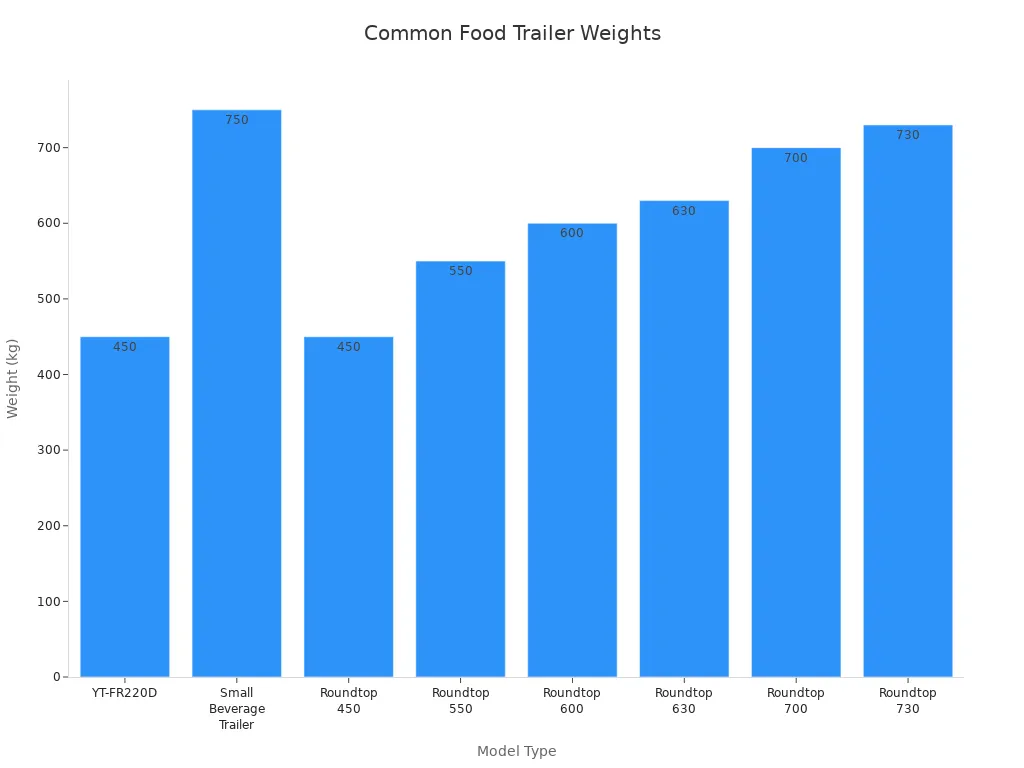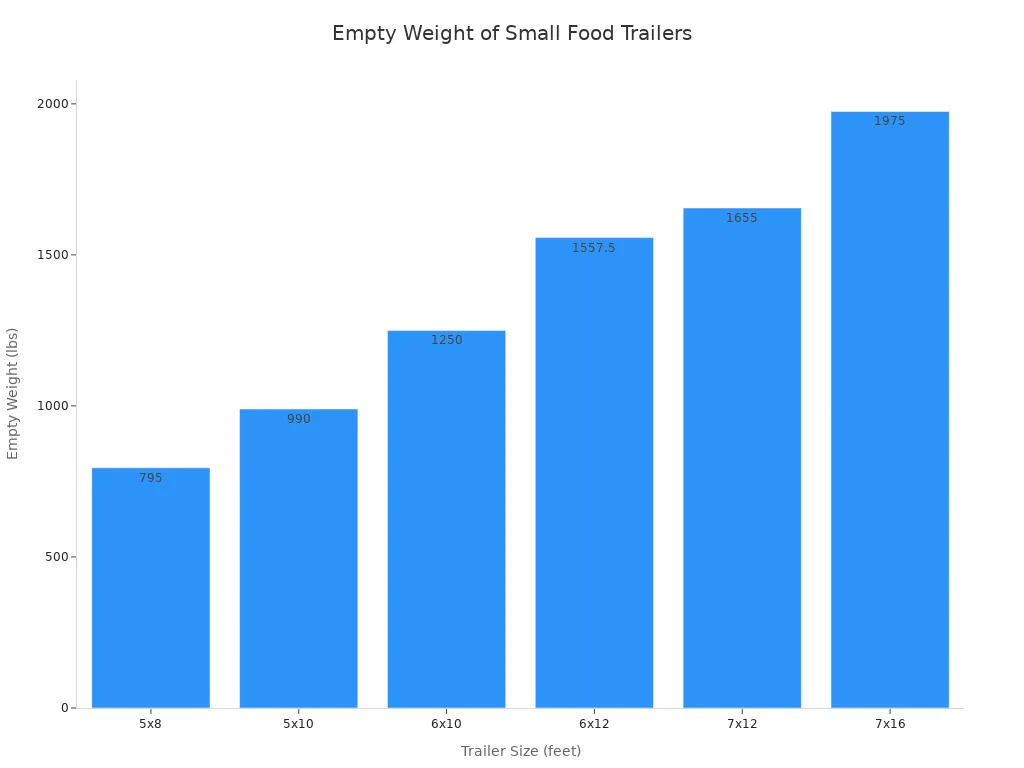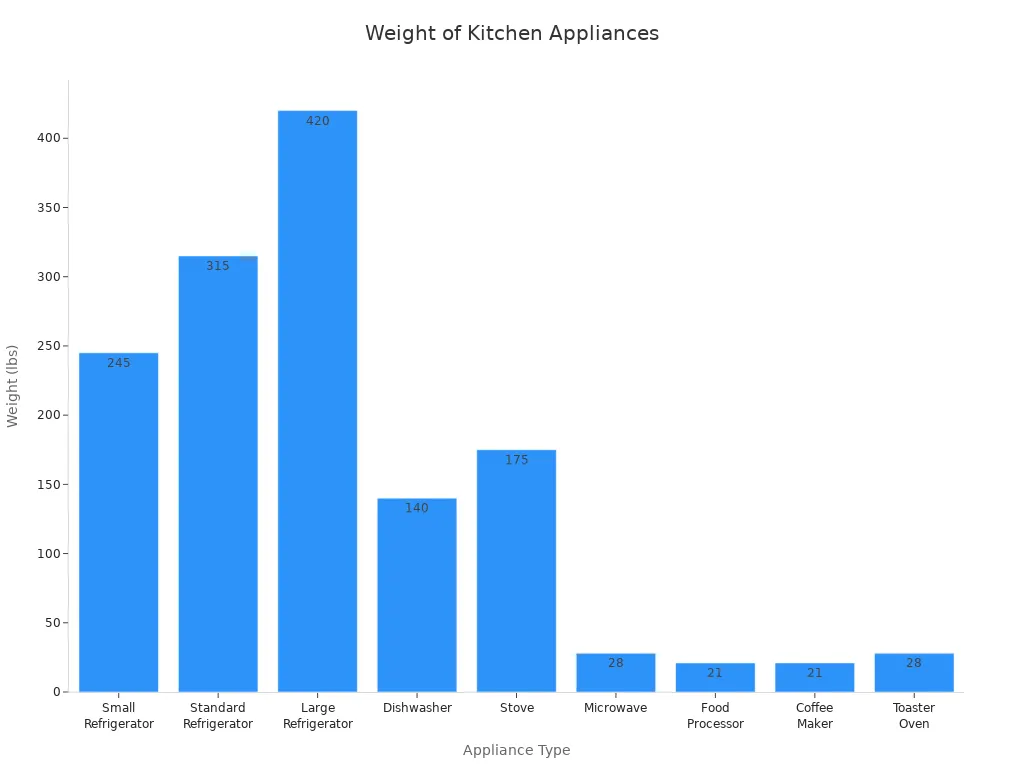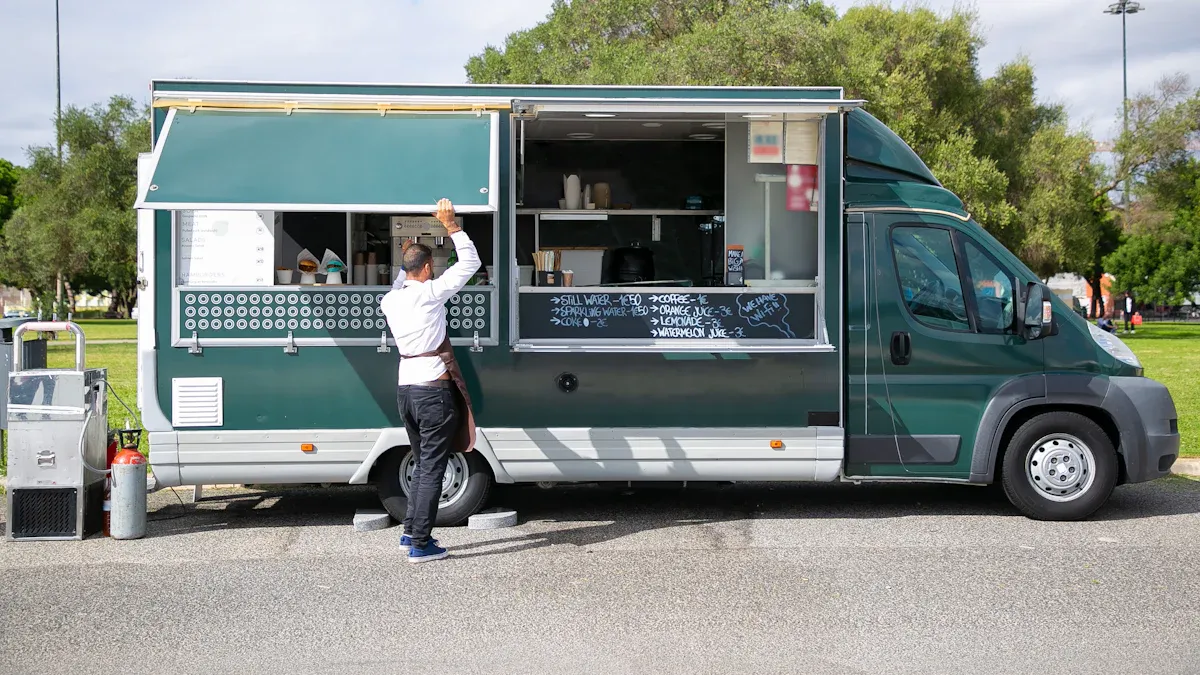


Views: 0 Author: Site Editor Publish Time: 2025-06-30 Origin: Site












You may ask, "How much does a food trailer weigh?" Most food trailers weigh from 2,000 to 9,000 pounds. The weight depends on the size, model, and built-in equipment. The trailer weight includes the body, appliances, and the hitch. Hitch weight is very important for safe towing. This matters when you move your food truck to events. If you put too much weight in your trailer, it is dangerous. Ignoring the hitch rating can cause brake failure or tire blowouts. You could even lose control of your trailer. Laws say you must follow the Gross Vehicle Weight Rating (GVWR). This rating is for your trailer and hitch. If you go over these limits, you can get fines. Insurance claims may be denied. Driving will also be unsafe. Always check the total weight before you tow your trailer. This includes the hitch. This is true for square food trailers, airstream food trailers, or custom food trucks. Weigh your trailer often and check the hitch load. This helps you stay safe and follow the rules.
Food trailers can weigh from 2,000 to 9,000 pounds. The weight depends on the size and equipment. Always check the trailer’s weight before you tow it.Make sure your trailer’s weight matches your hitch rating. Your towing vehicle must also match the trailer’s weight. This keeps you safe and helps you avoid accidents or fines.Small trailers are easy to tow with SUVs. Medium trailers need stronger trucks. Large trailers need heavy-duty vehicles.Adding kitchen appliances makes the trailer heavier. Custom features also add more weight. Plan carefully so you stay within safe towing limits.Use public scales or portable truck scales to weigh your trailer often. Keep your load balanced so you can drive safely.
When you look at food trailers, you will notice that their weight can vary a lot. Most small food trailers weigh between 990 and 1,650 pounds. These lighter models work well for city streets and small events. You can tow them with an SUV or a small truck. Larger food trailers, like those used for full-service kitchens, can weigh much more. Some reach up to 9,900 pounds when fully loaded.
Here is a table that shows the typical weight range for different food trailer models:
Model Type | Weight Range (kg) | Weight Range (lbs) | Notes |
|---|---|---|---|
YT-FR220D | 450 | ~990 | Compact, easy to tow, urban use |
Small Beverage Trailer | < 750 | < 1650 | Lightweight, suitable for small vehicles |
Roundtop Food Trailer | 450 - 730 | ~990 - 1609 | Multiple variants, easy towing |
You can see that small trailers are much lighter. They are perfect for quick service and easy transport. If you want to run a mobile kitchen or a concession trailer, you may need a larger model. These can carry more equipment and supplies.
Tip: Always check the trailer weight before you plan your route. This helps you choose the right towing vehicle and avoid problems with your hitch.

Food truck size plays a big role in how much your trailer will weigh. For example, an 8.5x20 ft food trailer has a base weight of about 3,200 pounds. When you add all your kitchen equipment, supplies, and water tanks, the total weight can reach up to 9,900 pounds. This is called the Gross Vehicle Weight Rating (GVWR). You must never go over this limit.
Here is a table that shows the base and fully loaded weights for a common food trailer size:
Specification | Value |
|---|---|
Base Weight (Empty) | 3,200 lbs |
Gross Vehicle Weight Rating (GVWR) | 9,900 lbs |
Payload Capacity | 6,700 lbs |
Trailer Dimensions | 8.5x20 ft |
Qingdao Seahisun Food Truck Technology Co., Ltd. offers many types of food trailers. You can choose from square food trailers, airstream food trailers, electric food trucks, round food trailers, and custom food trucks. Each type has different food truck dimensions and weight. For example, a square food trailer gives you more space for equipment, while an airstream food trailer has a unique look and lighter build.
If you want to start a food truck business, you need to think about food truck size and trailer weight. A bigger trailer lets you serve more customers, but it also needs a stronger hitch and a bigger towing vehicle. Always match your food truck size to your business needs and your towing limits.
Note: The hitch is a key part of your setup. Make sure your hitch can handle the full trailer weight, including all your equipment and supplies. Check the hitch rating before every trip.
Qingdao Seahisun Food Truck Technology Co., Ltd. leads the industry with a wide range of food trailers and food trucks. Their products meet strict safety standards and come with all the certifications you need for legal use in the United States and Europe. You can find more details about their product lines, including concession trailers and mobile kitchens, on their official website.
When you choose a food trailer, you need to know how trailer weight changes with size. Trailer weight affects what vehicle you need, how much you can carry, and where you can park. Let’s look at the three main categories: small, medium, and large trailers. Each type has different food truck dimensions, weight, and towing needs.
Small food trailers work well for beginners or for serving snacks and drinks at local events. You can tow these trailers with a regular SUV or a light-duty truck. Most small trailers measure between 5 and 16 feet long. Their empty weight ranges from about 700 to 2,200 pounds. The Gross Vehicle Weight Rating (GVWR) for these trailers usually stays under 7,000 pounds.
Size (feet) | Empty Weight (lbs) | Payload Capacity (lbs) | GVWR (lbs) |
|---|---|---|---|
5x8 | 700-890 | 2,250-2,610 | 3,500 |
5x10 | 990 | 2,510 | 3,500 |
6x10 | 1,250 | 2,250 | 3,500 |
6x12 | 1,340-1,775 | 2,160-5,225 | 3,500-7,000 |
7x12 | 1,385-1,925 | 2,115-5,075 | 3,500-7,000 |
7x16 | 1,725-2,225 | 1,775-4,775 | 3,500-7,000 |
You can see that small trailers are easy to move and park. They fit well in city spaces and at small festivals. Seahisun’s Square Food Trailer-06 is a good example. It measures about 13 feet long and weighs 1,000 kg (about 2,200 lbs). This trailer uses strong materials like galvanized sheet and FRP. You can use it for hot dogs, pizza, or snacks. It comes with CE and ISO9001 certifications, so you know it meets safety standards.
Tip: Small trailers are perfect if you want a simple concession trailer or a mobile kitchen for quick service.

Medium food trailers give you more space for equipment and staff. These trailers usually measure from 16 to 20 feet long. Their empty weight often ranges from 2,500 to 4,000 pounds. When fully loaded, the trailer weight can reach 7,000 to 10,000 pounds. You need a stronger towing vehicle, like a Ford F-250 or a Dodge Ram 3500, to move these trailers safely.
Aspect | Details |
|---|---|
Trailer Weight Impact | You must check your vehicle’s towing capacity and hitch class. |
Vehicle Towing Capacity | Trucks like the Ford F-250 can tow 12,300-15,000 lbs. |
Hitch Size | Most medium trailers use a 2 5/16 inch hitch ball. |
Safety Equipment | Always use safety chains and check your coupler and hitch ball size. |
Customer Responsibility | Make sure your vehicle and trailer match in specs and hookup. |
Seahisun offers many medium-sized trailers, such as the Seahisun-05 Model. This trailer weighs about 900 kg (about 2,000 lbs) empty. You can customize it as a mobile kitchen or a custom concession trailer. Medium trailers let you add more appliances, like fryers or grills, so you can serve a bigger menu.
Note: Medium trailers give you more room for food prep and storage. You can serve more customers at busy events.
Large food trailers work best for full-service kitchens or high-traffic locations. These trailers range from 20 to 30 feet long. Their empty weight starts at 4,000 pounds and can reach up to 8,000 pounds. When fully equipped, food concession trailer weights can go as high as 16,000 pounds. You need a heavy-duty truck to tow these trailers. Parking and turning also become harder with large trailers.
Trailer Size Options | Dimensions (ft) | Towing Weight Requirement (lbs) |
|---|---|---|
Compact | 6 x 12 | Lower towing requirements |
Mid-size | 8 x 16 | Moderate towing requirements |
Large | 8.5 x 20 | Higher towing requirements |
Maximum | 8 x 24 | 5,000-8,000 (empty) |
Parameter | Typical Range / Example |
|---|---|
Length | 18 to 30 feet (large food trailers) |
Width | 7 to 8 feet |
Height | 8 to 10 feet |
Weight (fully equipped) | 12,000 to 16,000 lbs |
Seahisun’s Ice Cream Airstream Food Trailer and Citroen Food Truck are examples of large trailers. The Ice Cream Airstream model weighs between 1,000 and 1,300 kg (2,200-2,900 lbs) empty. The Citroen Food Truck, a larger electric model, weighs about 1,800 kg (almost 4,000 lbs). These trailers can hold full-size appliances, water tanks, and storage for a busy mobile kitchen.
Large trailers let you run a full-service food truck business. You can serve hundreds of customers each day, but you must plan for higher trailer weight and bigger towing needs.
Food truck size changes everything about your trailer. Small trailers are easy to tow and park. Medium trailers give you more space for cooking and storage. Large trailers let you run a full mobile kitchen or custom food trucks, but you need a powerful towing vehicle. Always check your trailer weight before you buy or tow. Make sure your vehicle matches the trailer’s needs. This keeps you safe and legal on the road.
Always match your food truck size and trailer weight to your business goals and towing limits. This helps you avoid problems and keeps your concession trailer running smoothly.
When you pick a food trailer, you should think about what makes it heavy or light. The weight changes based on the food trailer equipment you put inside, the materials you use, and any custom features you add. These choices change how easy it is to tow your concession trailer and how much stuff you can bring in your mobile kitchen.
Food trailer equipment can make your trailer much heavier. Some things weigh a lot more than others. Here are the main things that add weight:
Big cooking appliances like commercial fryers, griddles, and charbroilers can each weigh over 200 pounds.
Refrigeration units, like prep refrigerators and freezers, often add 300 pounds or more.
Propane tanks and water tanks also make the trailer heavier.
Plumbing systems, such as sinks and water heaters, add extra pounds.
Ventilation equipment, like exhaust hoods and fire suppression systems, also add to the total weight.
Power systems, such as generators and electrical panels, are needed for your food trailer equipment.
You can see how much common kitchen appliances weigh in this table:
Appliance Type | Approximate Weight (lbs) |
|---|---|
Small Refrigerator | 245 |
Standard Refrigerator | 315 |
Large Refrigerator | 420 |
Dishwasher | 140 |
Stove | 175 |
Microwave | 28 |
Food Processor | 21 |
Coffee Maker | 21 |
Toaster Oven | 28 |

The materials you pick for your trailer frame and walls matter a lot. Steel frames make your concession trailer strong but add more weight. Aluminum frames are lighter and help you save money when towing. Seahisun uses food-safe materials like galvanized sheet and FRP for safety and strength. Insulation and weatherproofing add pounds but keep your mobile kitchen comfortable in any season. Electrical systems and plumbing, including water tanks and pumps, are heavy but needed for daily use.
Customization lets you design a trailer that fits your business. You can choose special sizes, stronger floors, extra shelves, or climate control. Each custom feature adds to the trailer’s weight. For example:
Stronger walls and insulation help with temperature control but make the trailer heavier.
Upgraded electrical systems and plumbing make your trailer more useful but add weight.
Picking the right features for your food trailer equipment helps you manage weight and stay within safe towing limits.
Tip: Always match your trailer’s features to your business needs. Too many upgrades can make your concession trailer hard to tow and cost more to use.
You must know your trailer’s weight before driving. Every towing vehicle has a limit for how much it can pull. If you go over this limit, your engine and brakes work too hard. This can make your vehicle break down faster. A heavy trailer makes it harder to speed up or stop. Your hitch and tongue weight must fit your trailer’s load. Too much tongue weight can make the trailer sway or break the hitch. Always check your towing limit, hitch rating, and tongue weight before moving your food truck or concession trailer. Keep your trailer’s weight under the limit to stay safe and protect your food truck.
If you go over the towing limit, you might:
Break your vehicle’s frame, suspension, or axles
Make it harder to steer and stop
Cause the trailer to sway or crash
Lose your warranty or get in trouble with the law
You have to follow road weight rules and local laws when you use a food truck or mobile kitchen. In the United States, the biggest allowed weight is 80,000 pounds, but your trailer will weigh much less. You still need to check axle limits and make sure your hitch and tongue weight are legal. Many cities want you to have a Mobile Food Facility Permit, a Public Health Permit, and a business license. You might also need a special vehicle certificate from local offices. Seahisun gives you VIN codes and all the papers you need, like DOT and COC, so you can register your trailer fast and legally.
Region | Max Gross Vehicle Weight | Axle Configuration | Notes |
|---|---|---|---|
United States | 80,000 lbs | 5 axles | Federal road weight limits |
Europe | 88,000 lbs | 6 axles | Higher limits, more axles |
Trailer weight changes how safe your food truck is. If you put too much in your trailer, your generator can get too hot or even start a fire. Too much weight on the hitch or tongue can make your trailer wobble. You could lose control when turning or driving fast. Seahisun builds trailers with safety in mind. They use safe materials, strong frames, and good air flow. Always balance your load and check your hitch and tongue weight before every trip. Take care of your brakes, tires, and hitch to keep your concession trailer safe and ready to use.
Tip: Don’t guess your trailer’s weight. Use a public scale and check your hitch and tongue weight every time you add new equipment.

Start by looking at the manufacturer’s specs for your food trailer. These specs tell you the trailer’s weight, size, and axle strength. Most companies, like Seahisun, give you a table with all the details. The table lists things like weight, length, width, height, axle rating, suspension, and hitch size. You can use these numbers to pick the right towing vehicle and hitch. Here is an example of what you might find:
Specification Item | Typical Details |
|---|---|
Weight | About 4,000 to 6,000 pounds |
Dimensions | Length (20-26 ft), Width (8-8.5 ft), Height (7-9 ft) |
Axle Ratings | 5200 lb axles |
Suspension Type | Leaf-spring axle suspension |
Towing Package | 2-inch hitch, brake lights, turn signals |
Electrical | 30 amp to 50 amp, 120/240V |
Water Capacity | 50 to 100 gallons |
Look for a sticker or plate on your trailer. This sticker shows the Gross Vehicle Weight Rating (GVWR) and hitch needs. Seahisun also gives you a VIN label and legal papers for registration.
There are a few ways to check your trailer’s weight. Public weigh stations are a good choice. You drive your trailer onto the scale to see the weight. Portable truck scales are another way to check. These scales are easy to carry and use if you can’t get to a public scale. Some portable scales are weigh pads or axle scales. They give fast results and help you check before every trip. Make sure your scales are set up right for the best results. Always weigh your trailer after adding new equipment or making changes.
Portable truck scales are strong and simple to move.
Public weighbridges give official weight numbers.
Good setup and calibration make results more accurate.
Weigh your trailer with all your gear and supplies inside.
You must count every piece of equipment and every change when checking your trailer’s weight. Follow these steps to stay safe and legal:
Find the GVWR and empty trailer weight on the trailer, title, or manual.
If you can’t find the specs, weigh your empty trailer at a public scale.
Add the weight of all your equipment, water, and supplies.
Remember, the GVWR includes the trailer, cargo, fluids, and extras.
Check your trailer’s weight after every big upgrade or change.
Keep your total weight 10-15% under the GVWR for safety.
Make sure your trailer and hitch fit your towing vehicle’s limits.
Contact Seahisun for more product info and help.
Tip: Don’t guess your trailer’s weight. Use real numbers to keep your business safe and follow the law. Seahisun can answer your questions about hitches and registration.
You need to know your trailer weight, size, and equipment before you buy or tow. Always check your trailer’s GVWR, tongue weight, and hitch setup. Use this checklist to stay safe:
Verify trailer GVWR, tongue weight, and trailer weight.
Confirm your tow vehicle matches the trailer’s hitch and weight.
Ensure the hitch ball size is correct.
Check for two safety chains under the hitch coupler.
Inspect the coupler and hitch for fit.
Review the hookup checklist for hitch, wiring, and ball.
Practice safe hitch hookup.
Lock the coupler clamp on the hitch.
Consulting Seahisun helps you understand shipping, certifications, and product quality. You get expert advice on trailer, hitch, and concession trailer options. You can also explore mobile kitchen solutions for your business.
You can check the manufacturer’s specs or use a public scale. Always weigh your trailer with all equipment and supplies inside. Seahisun provides detailed weight information for every food trailer model on their official website.
A food trailer attaches to a vehicle and can carry more equipment. A mobile food cart is smaller and easier to move by hand. You can use both for street food, but trailers offer more space for a full mobile kitchen.
You can tow small food trailers or concession trailers with some SUVs. Always check your SUV’s towing capacity and compare it to the trailer’s weight. For larger trailers, you need a heavy-duty truck.
Food trailer weight affects your towing needs, safety, and legal compliance. If you overload your trailer, you risk fines and accidents. Always match your trailer’s weight to your vehicle and follow local laws for mobile kitchens.